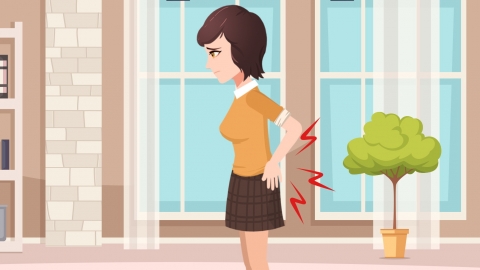What causes lower back soreness and bloating during menstruation?
Lower back soreness and bloating during menstruation may be caused by elevated prostaglandin levels, pelvic congestion, primary dysmenorrhea, endometriosis, or pelvic inflammatory disease. Symptoms can be relieved through methods such as heat application, posture adjustment, and medication. Seek prompt medical attention if pain is severe or accompanied by abnormal bleeding or fever.
1. Elevated Prostaglandin Levels: During menstruation, increased secretion of prostaglandins by the uterus stimulates uterine contractions that radiate to the lower back, causing backache and lower abdominal bloating. Pain is typically intermittent. It is recommended to apply a hot water bottle to the waist and abdomen, avoid prolonged sitting or standing, and drink warm brown sugar water to alleviate discomfort.
2. Pelvic Congestion: During menstruation, pelvic tissues become congested and swollen, compressing surrounding nerves and tissues, leading to lower back soreness and a sensation of heaviness in the lower abdomen. Symptoms may worsen with fatigue. It is advised to rest in bed and reduce physical activity, lie on your side to relieve pelvic pressure, and avoid strenuous exercise and heavy physical labor.

3. Primary Dysmenorrhea: Excessive contraction of the uterine smooth muscle and vascular spasms lead to uterine ischemia and hypoxia, resulting in lower back soreness and severe lower abdominal pain, possibly accompanied by nausea and vomiting. It is recommended to take medications such as ibuprofen sustained-release capsules, naproxen tablets, or Tongjing Bao granules under medical guidance to relieve symptoms.
4. Endometriosis: Endometrial tissue grows abnormally outside the uterus—such as in the pelvic cavity—and bleeds during menstruation, irritating surrounding tissues and causing lower back soreness and persistent abdominal pain that progressively worsens. Under medical supervision, medications such as dydrogesterone tablets, ethinylestradiol/cyproterone acetate tablets, or ibuprofen suppositories may be used to manage symptoms.
5. Pelvic Inflammatory Disease (PID): Bacterial infection causes inflammation in the pelvic region. Menstrual pelvic congestion exacerbates inflammatory irritation, leading to lower back soreness, aching pain in the lower abdomen, increased vaginal discharge, and odor. Follow medical advice to use medications such as cefixime dispersible tablets, metronidazole tablets, or Fuyankang capsules to improve symptoms.
Maintain good external genital hygiene and change sanitary pads frequently. Eat warm, mild, and light foods; avoid raw, cold, spicy, or irritating foods. Keep the waist and abdomen warm, and engage in moderate walking to promote blood circulation and help relieve discomfort.




